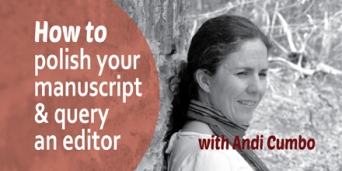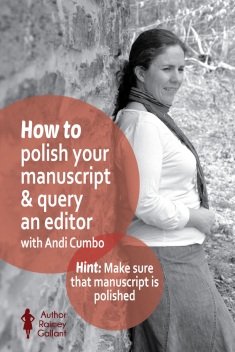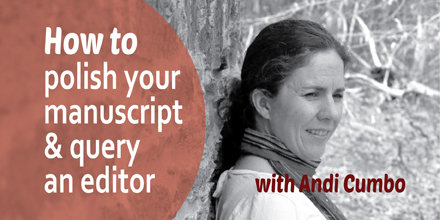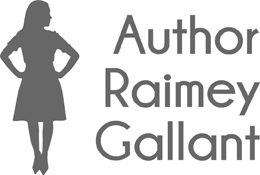
The Internet is flush with editors. So I should be able to email my favorite genre matches, and they’ll jump at the chance to work with me, right? Not necessarily. Logic dictates that editors can only take on so many projects at a time. Editor Andi Cumbo explains how to put your best foot forward.
Andi Cumbo is a writer, editor & farmer. She teaches writing, coaches writers, edits manuscripts for other writers, and runs writing retreats at her farm in Virginia. She holds an MFA in Creative Writing and an MA in Literature, and has taught at several colleges and universities including George Mason University, Cecil College, Stevenson University, Santa Clara University, and Solano College. Follow her writing and editing journey on Facebook and Twitter.
1. What information should an author query a potential editor with?
Great question. I suspect every editor will answer this differently. When I hear from an author I don’t know, I want to know a bit about the book—i.e. the blurb, back cover copy, or just a quick description; this information helps me get a sense both of the content of the book and how well the writer can describe his/her work. I want to know ho w many words the manuscript has, and I use this number to give quotes and timelines. I want to know what type of editing the writer wants or to know the writer is aware that they need help determining what type of editing they need. I’ve recently written a post about the ways I define the various types of editing, but every editor defines these terms slightly differently. So it’s wise to talk with the editor to be sure you’re on the same pages with your definitions. Finally, and in some ways most importantly, I want to know the author has reasonable expectations of what the editing process is. If someone wants me to do a content edit for a full, book-length manuscript in 5 days, that’s a red flag for me because that process takes a great deal of time. Or if the author balks at the price for a certain type of work, I take a moment because, while I certainly understand budgets (boy do I!), the work of editing is time-consuming, and a wise writer wants the editor to take her time and do the work well. Finally, if a writer asks me about how many bestsellers I’ve edited, I take a deep breath and know this client probably isn’t for me because, well, my editing work doesn’t guarantee a bestseller. The process of getting on those lists is VERY complex, and many things factor in – including the content of the book, the cover design, what other books are out. So in short, if a writer has expectations I cannot fulfill—even with my extensive experience and strong testimonials, then I will wish them the best but not take them on as a client because, in the end, the editing relationship isn’t going to work. And that’s really key – when you select an editor, you are choosing someone to trust with one of the biggest labors of your life. You have to like that person and believe they are going to do the best work for you and your book. Not every editor is right for every writer or for every book. . . so be wise and trust your gut when choosing.
w many words the manuscript has, and I use this number to give quotes and timelines. I want to know what type of editing the writer wants or to know the writer is aware that they need help determining what type of editing they need. I’ve recently written a post about the ways I define the various types of editing, but every editor defines these terms slightly differently. So it’s wise to talk with the editor to be sure you’re on the same pages with your definitions. Finally, and in some ways most importantly, I want to know the author has reasonable expectations of what the editing process is. If someone wants me to do a content edit for a full, book-length manuscript in 5 days, that’s a red flag for me because that process takes a great deal of time. Or if the author balks at the price for a certain type of work, I take a moment because, while I certainly understand budgets (boy do I!), the work of editing is time-consuming, and a wise writer wants the editor to take her time and do the work well. Finally, if a writer asks me about how many bestsellers I’ve edited, I take a deep breath and know this client probably isn’t for me because, well, my editing work doesn’t guarantee a bestseller. The process of getting on those lists is VERY complex, and many things factor in – including the content of the book, the cover design, what other books are out. So in short, if a writer has expectations I cannot fulfill—even with my extensive experience and strong testimonials, then I will wish them the best but not take them on as a client because, in the end, the editing relationship isn’t going to work. And that’s really key – when you select an editor, you are choosing someone to trust with one of the biggest labors of your life. You have to like that person and believe they are going to do the best work for you and your book. Not every editor is right for every writer or for every book. . . so be wise and trust your gut when choosing.
2. As an editor, which draft do you want to see?
Another great question. As an editor, I want to see the manuscript only after the writer has done everything s/he knows how to do. So I don’t want to see the first draft or even the second. I want the writer to have battled and struggled and tested and adjusted as much as s/he can determine to do. Then, when s/he is left with no clear direction about what to do next, that’s when I come in. I think about it this way—if the writer knows what to do to make something better, there’s no value in paying me to do that. It’s wiser for the writer to improve the work as best s/he knows how and THEN, bring me in to point out what I see or to help her/him solve problems that s/he doesn’t know how to solve yet.
3. Can you offer advice on pre-editing blogs/resources?
Sure, I love a few websites especially. 1. Joan Dempsey: Joan’s resources on revision, in particular, are splendid and useful. 2. DIY MFA: This site is the creation of Gabriela Pereira, and she dispenses great advice on the craft of writing. 3. Jane Friedman: Jane gives a great deal of good advice on publishing, but her blog is also chock-full of great writing advice. 4. Terrible Minds: Chuck Wendig has some of the best writing advice out there. He’s witty and smart, and he isn’t afraid to speak his mind. 5. Me: I write weekly on some aspect of writing—craft or the writing life or publishing, and I also run a free online community for writers. A more general piece of advice here, too. Not all writing wisdom is going to work for you. Some of it will be downright wrong for your life, so don’t get burdened by reading too much advice. It can be absolutely overwhelming. Instead, find a few sources of information from people you like and trust (that’s key), and then just read their work. It’s not necessary to read every bit of writing advice from every person out there. . . instead, take what you need and feel free to discard the rest. Really. Just because Earnest Hemingway or Jesmyn Ward did it, doesn’t mean you have to.
You can learn more about Andi’s editing expertise here.
I wrote this post for the monthly Insecure Writers Support Group blog hop. To continue hopping or to join the hop, click here. (There are more than 200 of us, and it’s fun!)
Do you have any thoughts on finding and querying editors? I’d love to hear from you in the comments.


Fabulous information! I have been thinking of searching for editors and now I know how to make my own work most helpful to the process. Thank you 🙂
LikeLiked by 2 people
I know. I was ecstatic when Andi agreed to do the interview.
LikeLiked by 1 person
Great article! Loved all the links!
LikeLiked by 2 people
Thanks so much, Maria!
LikeLike
“It’s not necessary to read every bit of writing advice from every person out there. . . instead, take what you need and feel free to discard the rest.” Love this! It’s so easy to get bogged down with all the writing advice out there.
Great post!
LikeLiked by 2 people
I’m drowning in it. 😉
LikeLiked by 1 person
Agreed. I once took extensive notes on a book and then promptly forgot the whole thing. Waste of time, unfortunately 😦
LikeLiked by 2 people
Thanks for this post, Rainey and all the great information. I’ll def check out Andi’s blog. I
could use some advice on fine-tuning.😆
LikeLiked by 2 people
I found her post on the different types of editing especially helpful. It’s the one I link to.
LikeLiked by 1 person
Yes, she seemed to be the real deal!
LikeLiked by 1 person
Great information, and links. bookmarked! First drafts should never be sent to an editor, at least not mine!!! 🙂
LikeLiked by 2 people
It kind of depresses me when I think of how many drafts I’ve been through, as opposed to how many I see articles recommend. I’m on the heavy side, I think, and it makes me wonder where I went wrong in my first draft to require so many go-throughs. 🙂
LikeLike
Such great information! Thank you for sharing this with us. And there’s a lot of helpful links here too. I can tell I’ll be off reading for the next hour or so.
Thank you!
LikeLiked by 2 people
My pleasure! Thank you for stopping by and sharing your thoughts!
LikeLiked by 1 person
Wonderful advice. Thanks so much. 🙂
Anna from elements of emaginette
LikeLiked by 2 people
My pleasure. 🙂 And thanks for your post about the caves around British Columbia. It really makes me think I need to go back.
LikeLiked by 1 person
Thanks, Raimey. I know I’ll eventually need an editor, so learning how to contact and pick one is good to know. I’m heading over to Andi’ blog now. .
LikeLiked by 2 people
So happy you found this helpful. I did too. 🙂
LikeLike
Excellent advice. It always kills me when someone starts asking for help, and they’re not even through their first draft, or they just completed the first draft. Picture me slapping my forehead. But, we all have to go through that stage where we learn that we have to know the business and figure out the rules.
LikeLiked by 2 people
Exactly. Though, I imagine some editors might be willing to take on first drafts, but there are probably specific circumstances surrounding that. For instance, if there is an established relationship, and the edit is for plot only. On the flip side of this post is that there are also editors who will critique plot outlines, which I’m seriously considering for my next novel. I might like that reassurance that my plot is sound before I start writing, though our plots change/mutate as we write, don’t they? It’s inevitable.
LikeLike
P.S. Great post on how to run a blog tour as well. I’m definitely going to have to refer back to that at some point.
LikeLike
Thanks for sharing this insight. There is so much info out there and the internet, while helpful, can also be a hindrance for that same reason.
LikeLiked by 2 people
As an editor myself, I love her answer to #1. I also look to see if the writer/author is professional. How do they set up their email to me? Do they seem legit? When an email is poorly constructed, I know the book will be, too. I’ve had writers say they can pay with credit, or want their book edited ASAP, or want to publish next month (most likely right after getting my edits back). Well, that doesn’t work for me, and telling me you’ll publish so soon really says you won’t put in the effort that is required of writers after edits. I made that mistake once. Never again.
LikeLiked by 1 person
I didn’t know you were an editor as well. Which genres do you specialize in?
LikeLike
Really like the change up on your blog. Looks good. Great information. You always offer such good stuff. Thank you. ‘ Juneta @ Writer’s Gambit
LikeLiked by 2 people
Someone noticed! Ah! Thank you, Juneta. I worked hard on spiffing things up on here, as well as making all my images Pinterest friendly. It isn’t perfect of course, but I only have so much time to dedicate to the website. And thanks for stopping by!
LikeLiked by 1 person
Great info. What a splendid idea to have a guest author for IWSG monthly post.
LikeLiked by 2 people
thanks for the wonderful info 🙂
LikeLiked by 1 person
My pleasure. Thanks for stopping by!
LikeLiked by 1 person
Great suggestions. I’m a Jane Friedman fan. She has such down-to-earth advice.
LikeLiked by 1 person
The guest editor on this post, Andi, runs a writers’ retreat, and I believe Jane Friedman is one of the speakers. You should check it out, depending on where you live of course. 🙂
LikeLike
Thanks for the great info, especially number 2. I have long been a fan of Chuck Wendig and look forward to bookmarking the other sites.
LikeLiked by 1 person
My pleasure!
LikeLike
I also liked that Andi advised taking it as far as you can yourself before asking for help. That’s what I try to do with beta readers as well. I also really appreciated all the links! My favorite go-to for writing advice is Mary Kole at kidlit.com.
LikeLiked by 1 person
I own her book!
LikeLike
Thanks to Andi for all that great information. Lots to think about! X
LikeLiked by 1 person
“Not all writing wisdom is going to work for you.” I think this is the most valuable piece of advice ever! Of course the whole post was very helpful- thank you for publishing it.
But I hear so many people say but so and so did it, or I heard you should… and they are trying to squeeze their round shapes into square holes.
Do what works and discard what doesn’t.
Thank you again, Raimey, for another wonderful post.
Ann
LikeLiked by 1 person
Thanks Ann! Exactly what you describe was me last October, like how do I combine all these plot structures together to make the perfect structure. In the end, I had to learn that I needed to trust my instincts a little more, and rely on the multiple structures as guidelines.
LikeLike
I can’t imagine handing any editor a draft that wasn’t the best I could make it! Seems like a waste of money to have someone edit a mess. Not to mention wasting that person’s time.
LikeLiked by 2 people
Agreed!
LikeLike
Gosh this is an absolute *fantastic* article!! A lot of information to process- but all put very clearly and I love the helpful links!!
LikeLike
Great interview. The links look really helpful too. Great information for writers looking for an editor.
LikeLiked by 1 person